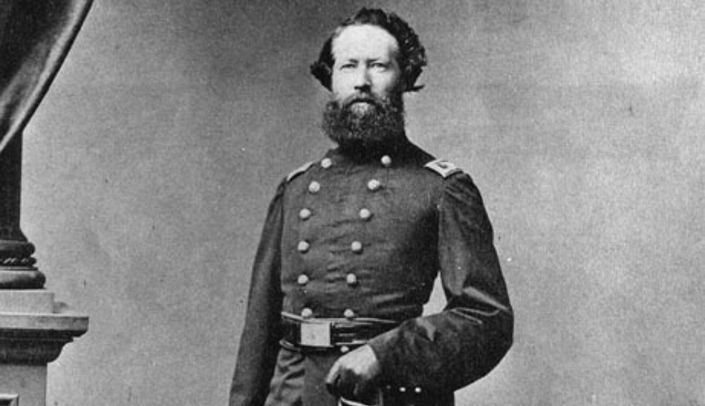In 1881, a group of experienced physicians founded the Omaha Medical College — the precursor to UNMC — and in the process left their mark on Omaha and Nebraska's medical history.
Nationally, many of those founders had a significant impact as veterans of the Civil War.
Jacob Denise, MD (1828-1899), was born in Ohio and graduated from the Jefferson Medical College in Philadelphia. Dr. Denise served as an assistant surgeon in the 27th Ohio Volunteers, who were attached to numerous units during the war, such as the Department of the Missouri, which for a short time included the Nebraska Territory. Dr. Denise rose to the position of surgeon in 1863. He moved to Omaha in 1868 and specialized in eye and ear diseases. In addition to founding Omaha Medical College, he helped establish the Nebraska State Medical Society.
Robert Livingston, MD (1827-1888), was born in Montreal. He attended McGill University and the College of Physicians and Surgeons in New York. Dr. Livingston moved to Plattsmouth in 1859 and organized Company A, First Nebraska Volunteer Infantry in 1861. The unit saw action in Tennessee at Fort Donelson and the Battle of Shiloh. The army promoted Dr. Livingston to the rank of colonel. As one of the founders of the medical college, Dr. Livingston was professor of the principles and practice of surgery and faculty president — ostensibly dean of the college.
Samuel Mercer, MD (1842-1907), was born in Illinois. Dr. Mercer attended the University of Michigan, Chicago Medical College (today Northwestern University School of Medicine) and Berkshire Medical College in Massachusetts. He served as an assistant surgeon for the 14th Regiment of the Illinois Volunteers, which was involved in the Battle of Shiloh and the siege of Vicksburg, Mississippi. After arriving in Omaha in 1866, Dr. Mercer helped found Omaha Medical College and was chief surgeon for Union Pacific Railroad. Dr. Mercer also was a real estate developer and businessman.
Victor Coffman, MD (1839-1908), was born in Ohio and attended Jefferson Medical College. Dr. Coffman was the chief medical officer of the 13th Army Corps, serving as a commissioned brevet-lieutenant colonel under Ulysses S. Grant. The corps saw action at Vicksburg. Dr. Coffman moved to Omaha in 1867, partnered in founding the medical college and taught the theory and practice of medicine.
Richard C. Moore, MD (1841-1916), was born in Illinois and attended Chicago Medical College. From 1863 to 1864, Dr. Moore served as an acting assistant surgeon between terms in medical school. He spent most of his service on a hospital steamship on the Mississippi River. Dr. Moore moved to Omaha in 1865, helped establish the college and taught diseases of the mind.
The American Civil War introduced a level of physical trauma previously unseen by physicians. The Omaha Medical College's founders brought their experience to the new state of Nebraska and passed it along to a new generation of students.

I love seeing the way our country's military history intertwines into all aspects of our society!
This story was especially neat, thank you for putting it together, Erin.
Thanks for so much for this piece. Loved to learn how our institute started.